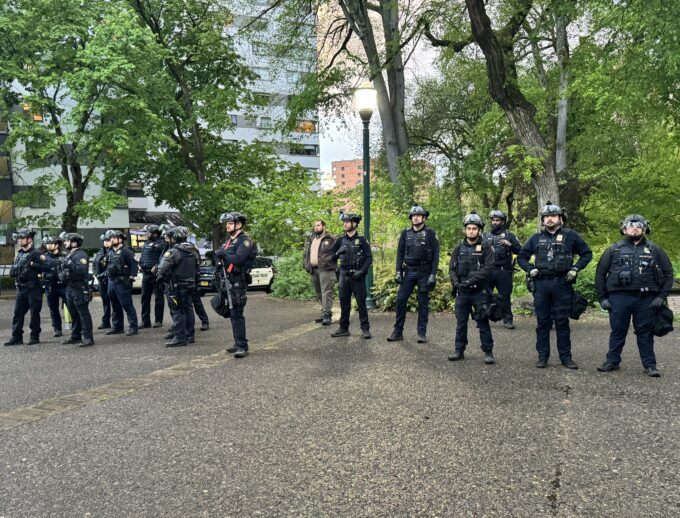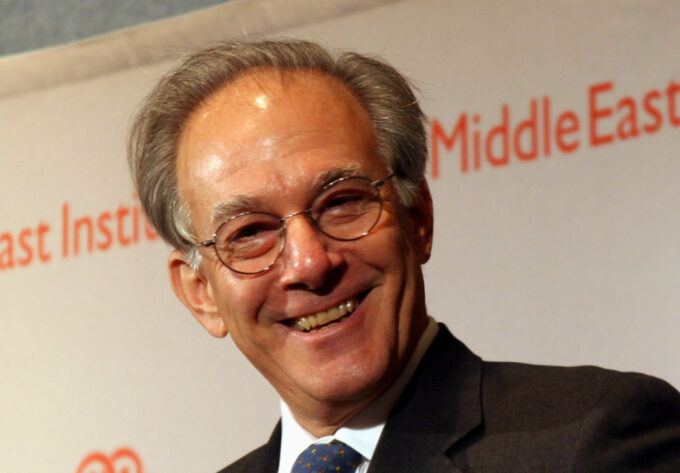Cops on Campus are the Real Outside Agitators

Portland Police on the campus of Portland State University. Photograph by Nathaniel St. Clair.
Nothing agitates a campus as dramatically as the arrival of the cops. Indeed, the cops have been the only real outside agitators on campuses across the country this Spring. They have brought upheaval and disorder by breaking up peaceful protests by disciplined students with a cause and ideals. And, of course, the administrators are responsible for calling in the cops. It’s the administrators who up the ante and invite confrontations and clashes. Blaming outsiders for rebellions and revolutions is one of the oldest and nastiest ruses in the world. And one of the newest, too. But it’s not working.
New Yorkers and others aren’t buying the Columbia administration’s story that outside agitators are to blame for the protests that have taken place on the campus. As though Columbia students are too blind or too stupid to see the terrors inflicted on the people of Gaza by the Israeli military with weapons supplied by the USA. At UCLA some masked men with clubs attacked pro-Palestinian demonstrators. The cops aren’t the only culprits now much as they weren’t in ‘68.
Columbia President Shafik must take us for idiots who haven’t learned the lessons of the past and can see what’s happening in front of our own eyes. I mean the abuses of state power in Gaza and to a lesser degree on college campuses from New York to California. I know loads about the cry that outside agitators are to blame for protest movements and rebellions. I’ve heard it before. I have been called one.
I graduated from Columbia College with a B.A. in 1963 and from Columbia University with an M.A. in 1964. By 1967 I was an assistant professor at the State University at Stony Brook. Along with more than 700 or so other protesters, including Abbie Hoffman and Tom Hayden – who coined the slogan “Create two, three, many Columbias” – I was arrested on the Columbia campus in ‘68 and went to jail briefly. I suppose in some respects I could have rightly been called an “outside agitator.” I had graduated from Columbia College five years before students occupied and liberated buildings where classes had been held, though I mostly relinquished the agitating on campus to the Black students who kicked off the 1968 rebellion soon after MLK was shot and killed. Now, that was an incitement to riot.
In ‘68 I didn’t think of myself as an outside agitator. I still reject that label. In the world today insurgents are both insiders and outsiders, localists and internationalists who reject political boundaries and borders. Imperialism respects no national boundaries and neither do anti-imperialists. The line that supposedly divides insiders from outsiders and domestic from imported agitators is far more blurry than it might seem to the casual eye. In ‘68 I felt that I had as much right to sit in as any of the undergraduates. I paid my dues. I had been miseducated and misinformed when I was a student.
I was arrested twice in ’68. The second time I went on trial in a courtroom after I declined to apologize to the Columbia administration when I was asked to do so by a representative of the university. “You are a Columbia graduate and a scholar and gentleman and as such ought to say you’re sorry for your actions,” I was told by Professor Quentin Anderson. In the eyes of the university I would not be an outside agitator if I kissed its academic ass. That I would not do.
I still feel like a member of the extended family of Columbia insurgents. I identify with the students who protested the invasion and occupation of Gaza this spring and who have been arrested.
As an undergraduate at Columbia in the early 1960s, when I marched against segregation and nuclear testing, my mentors and role models were off-campus radical intellectuals such as Carl Marzini and Paul Sweezy, civil rights activists like MLK and Rosa Parks and further afield Che Guevara, the continental revolutionary who was born in Argentina, joined Fidel Castro in Mexico, fought on the side of the guerrillas in Cuba and later against imperialism in the Congo and Bolivia.
When we referred to the Cuban revolutionaries by their first names as though we were brothers-in-arms, our Cold War profs – who saw Moscow gold behind all insurrections – were shocked. Like Che, only far more modest than he, American agitators belong to the world and to the legacy of homegrown anti-slavery men and women like Harriet Tubman and John Brown. Slavers didn’t respect boundaries and neither did abolitionists. Nightstick-wielding cops on campuses are “pigs.” I haven’t used that word, which I learned from the Black Panthers, for decades. But it’s as timely now as it was in ’68.

